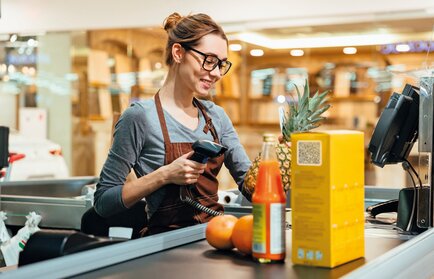2D Code in Retail: Mastering Sunrise 2027 Efficiently and Securely
Packaging and product labeling are undergoing major transformation. Whether it’s 2D codes, the PPWR, or the Digital Product Passport – REA is your experienced partner for practical, cost-effective and regulation-compliant implementation. Drawing on our pharma expertise, we now support FMCG manufacturers worldwide.

What’s Changing – and Why Now?
With the GS1 Sunrise 2027 initiative, the traditional EAN barcode is being replaced at point of sale by 2D codes such as DataMatrix or QR. At the same time, the EU Packaging and Packaging Waste Regulation (PPWR) demands greater recyclability and traceability. The Digital Product Passport (DPP) complements this by requiring product-specific, machine-readable information.
For FMCG manufacturers, this marks a fundamental shift – affecting packaging design, line integration, and data processes. Early action enables smart, scalable solutions – often more cost-effective than expected.
2D codes are more than just a replacement for linear barcodes. A GS1-compliant 2D code can carry:
- GTIN (product identifier)
- Best-before date (BBD)
- Batch number or serial number
- Material information (for recycling)
- Link to product data (via GS1 Digital Link)
These codes increase transparency, enable automated verification, and are a key building block for circular packaging systems.
The added value of the 2D Code goes far beyond pure data storage. It opens up new possibilities in various areas and offers significant advantages for both companies and consumers.
-
Inventory management: Ensuring accuracy, overview and freshness while avoiding waste.
-
Traceability: Ensuring product authenticity and transparency to increase consumer confidence.
-
Safety: Protecting brand integrity and preventing the sale of problematic products.
-
Sustainability: Promoting recycling and circular economy to reduce waste.
-
Consumer engagement: Providing product information and interaction opportunities for consumers.
-
Improved packaging: Optimization for marketing, regulatory compliance and better user experience.

Implementation Requirements & Challenges
- Choosing the right marking technology for your materials and line speeds
- Ensuring code quality (e.g. ISO/IEC 15415 compliance)
- Integrating data and code content in ERP/MES systems
- Aligning with regulatory requirements (e.g. DPP readiness)
- Verifying readability in real-time with inline systems
The requirements are complex - but you don't have to solve them alone. Whether you have initial questions or specific challenges: We support you with experience, clarity and non-binding advice - so that your line is fit for 2D, PPWR & more.
We now bring this know-how to the FMCG sector: - German-engineered systems, developed and manufactured in-house - Full technology range: inkjet, laser, label, verification - Inline code verification according to ISO standards - Integration with ERP, MES and audit systems - End-to-end project support: from analysis to rollout.
- Development & production in Germany
- Integration of all common technologies (inkjet, laser, label)
- Inline code verification in accordance with ISO standards
- Interfaces to ERP, MES, traceability
- Project support from requirements analysis to series production
Inkjet, laser, label – tailored to your packaging, speed and layout.
From primary to tertiary packaging – including recyclable and mono-material substrates.
Inline and offline code verification (ISO/IEC 15415, 15416, 29158).
Implementation support from data logic to print layout to QA interfaces.
GS1 Sunrise 2027, PPWR, DPP – we translate standards into practical execution.

Code verification for FMCG (verification, serialization and 1D/2D Codes)
The EU packaging regulation (PPWR) aims to reduce packaging waste and promote the circular economy. It stipulates that all packaging has to be recyclable by 2030. The regulation sets targets for reuse and recycling and promotes the use of recycled materials in new packaging. The PPWR applies to all EU member states.
The Digital Product Passport (DPP) is an EU initiative to promote the circular economy. It will contain information about products such as their origin, composition and recyclability. The DPP will be introduced gradually, starting with batteries in 2026, with the aim of promoting sustainability, transparency and more efficient resource management.
FMCG stands for Fast Moving Consumer Goods and refers to fast-moving consumer goods for everyday use. These include food, drinks, cosmetics and cleaning products, for example. These products stand out due to their high turnover rate. The FMCG market is characterized by large brand manufacturers and intensive marketing activities.





